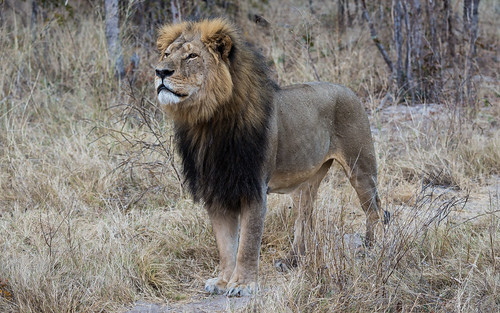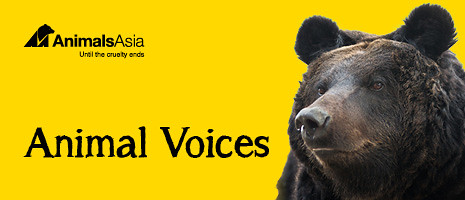Cecil the Lion: do we ever have the right to take a life?
05 August 2015
Picture via Flickr from Vince O'Sullivan
Rarely has the death of a single animal caused as much outrage as that of Cecil the Lion. His senseless slaughter has caused many to shudder at the ethics of allowing people to shoot animals in the name of economic pragmatism, but it should also make us discuss what right we have to take the life of any animal says Animals Asia’s Animal Welfare Director Dave Neale.
In a matter of days, Cecil has become a symbol of what is happening within many African countries where wildlife is for sale. “If it pays, it stays” is a phrase you may well have heard, referring to the fact that as long as wildlife has a price on its head then it will be protected and conserved. If this is the case, then Cecil and his family have had a price on their heads for many years and that price was met by a rich, thrill-seeking hunter.
I am pleased to see that due to this murderous act, the awful issue of ‘trophy hunting’ is now being discussed and debated in corners of the media that such issues rarely reach and people are rightly upset about the death of this beautiful lion. But I also feel that the debate and much of the outrage which has accompanied this issue is actually missing two crucial points.
Picture via Flickr from Vince O'Sullivan
In amongst the condemnation we should be crystal clear why we are outraged. Surely it is that we cannot accept a world where animals have a price tag on their heads. It cannot be morally acceptable for the pro-hunting lobby to say that trophy hunting pays and provides vital funds to conserve animals in the wild.
If we truly respect wildlife we would not pay to kill it, we would pay to conserve the habitat that each individual needs, and the many more that will come from this individual being alive. If people truly respected wildlife they would donate their hunting fees to habitat conservation or anti-poaching activities and so make a real and lasting impact without exacting such a grotesque payback. The hunters insisting that their self-styled altruism be repaid in blood are modern day Shylocks demanding their pound of flesh.
The second, broader and somewhat more crucial point that is not being discussed nearly enough, is that Cecil is the tip of the iceberg when it comes to animals being killed for gain.
Many of the people rightly outraged by the immorality of a person feeling he or she has the right to take the life of another living being are ignoring their daily role in a similar act. Hundreds of thousands of equally sentient creatures have their lives needlessly taken to fulfil nothing more than the majority’s desire to eat what they like.

Hypocrisy rules during these times of heightened awareness. In the time it takes to read this piece, many hundreds of thousands of chickens, fish, pigs, cows, and ducks have been slaughtered for us to eat. Hundreds of thousands of one-day-old chicks have been crushed alive as they were born male and are therefore of no ‘economic value’ to the egg laying industry. And many thousands of new-born calves have been forcibly removed from their mothers and killed so that we can take their mother’s milk to drink for ourselves. They die every day for our gain – and none of it is necessary.
I do not in any way wish for this to take away from the sorrow and misery that is felt by so many for the tragic death of Cecil, I would like this to open eyes that may not have been fully open to the suffering that is caused each and every day by the norms of our societies.
Cecil’s death has been played out in full public view, with tragedy for his stolen life and vilification for his killer. But for the billions of animals slaughtered each year for food, there is no hero and no villain – they have no story in the public consciousness.
Yes, let’s continue to be outspoken and outraged at the needless and senseless killing of Cecil. Let’s continue to debate the ethics of trophy hunting and the immorality of putting a bullet or arrow in a wild animal for pleasure – but at the same time, let’s spare a thought for the others. Let’s spare of a thought for the animal that will never have a name and never make the international news, yet they – alongside many billions of others – will meet the same fate that Cecil has met. Are their deaths not equally tragic and equally unnecessary?
BACK







 Healing the hidden wounds
Healing the hidden wounds
 Early summer awakening at the China Bear Rescue Centre
Early summer awakening at the China Bear Rescue Centre
 5 reasons the dog meat trade must end
5 reasons the dog meat trade must end